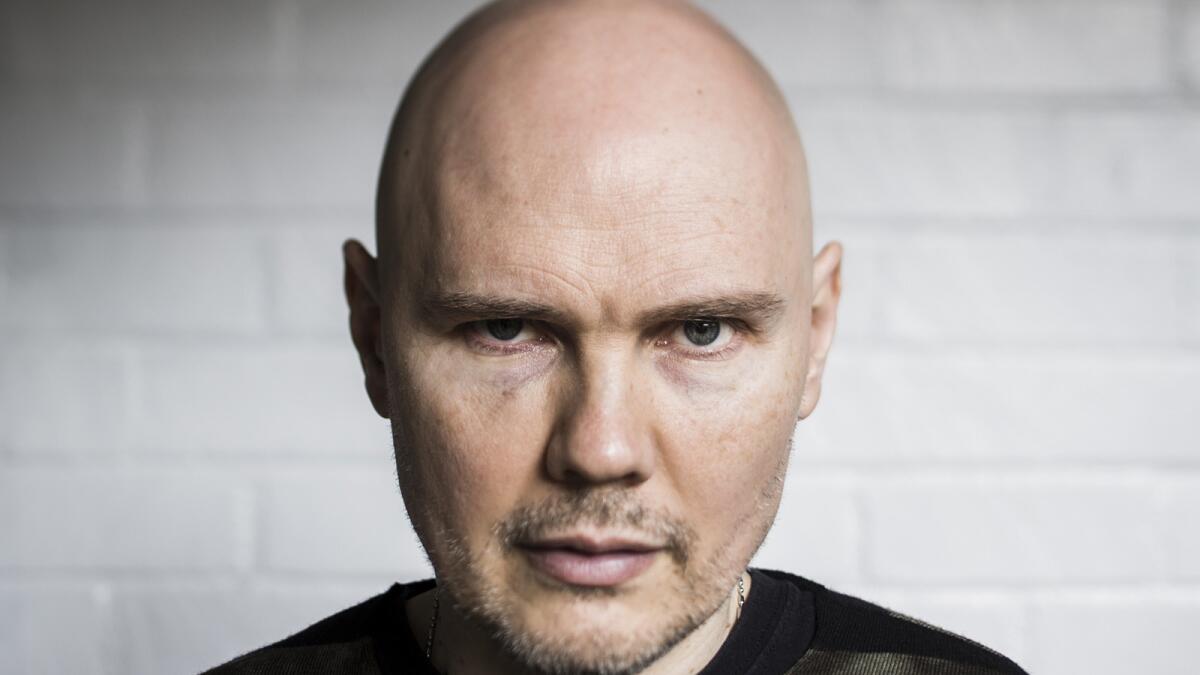Q&A: Billy Corgan on Smashing Pumpkins: ‘We’re in a vacuum’

Billy Corgan didn’t require any warming up in an interview last week at the Roosevelt Hotel in Hollywood.
“I’m on fire,” the Smashing Pumpkins frontman said as he took a seat by the pool, just hours after flying in from New York, where he’d spent a few days hyping his band’s new album, “Monuments to an Elegy.”
Corgan, 47, had come to L.A. for more promotion, including a performance on “Jimmy Kimmel Live” and a concert scheduled for Tuesday night at the Fonda Theatre. But the urgency radiating off him wasn’t merely the byproduct of a busy schedule. He had the tumult of the music industry -- and Smashing Pumpkins’ position in it -- on his mind too.
You’ve done the album-rollout thing so many times over the last 25 years -- with Smashing Pumpkins, with other bands, as a solo act. Is the experience anything more than a routine to you now?
It’s pretty much going as I figured. But there’s the intellectual part -- “It’s probably going to be like this, and I’m going to be in this position and have to fight my way out of this corner” -- and then there’s actually going through it. And that’s always so much more intense than your intellectual mind wants you to believe.
What’s the corner you’re fighting your way out of?
I think we’re in a culture war: the haves and the have-nots, the idiots and the people with some sensorial heart about the world. We’re in a dumbing-down of America and we’re in a brightening-up of America as people form their own systems, and then the rest of them just want to dig a little deeper into Middle-earth. It reminds me of the early days of that transitional culture of ’80s hair metal into grunge.
And this time hair metal is...?
Pop. It’s a numbers game. If you look at it on a microcosmic [level], a pop artist sells a lot more than my band or some other band. But if you look at it on a macro, music culture is so diminished. The numbers are so low. And everybody runs around like it’s the same, including people in this town. They’re still fronting like they know what they’re doing. Nobody knows what they’re doing! Meanwhile, up in San Fran, they’re making gazillions, making new models. And we’re here still twiddling our thumbs over who said this and who did that.
Your point is that music matters less than it did when Smashing Pumpkins began putting out records in the early ’90s.
We’re in a vacuum, is my point. Pick your year: ’86, ’71. The album release does not mean what it used to mean. It’s a cultural yawn.
Is the music important to you while you’re making it?
It’s very difficult to feel like it’s important. I feel like somebody with vaudevillian skills facing the advent of the movie business. Somebody’s going, “Hey, look, it’s really good that you can do that trick with the dog, but it doesn’t really mean anything anymore.”
So why continue? You’ve got other stuff going on, including a teahouse in suburban Chicago and a new musical that recently premiered.
I’m plotting. I feel like I started something, a conversation, when I brought the band back in 2006, and I want to finish that conversation. I don’t want to look back in 20 years and say, “Why didn’t you finish?” So I feel like one more record -- the one after this one -- that’ll be the end of the conversation.
“Monuments” is surprisingly upbeat, given your rather bleak view of the world. How’d these buoyant themes and catchy choruses happen?
Because I told myself to make this record in exchange for making the other record. So it’s like this is the be-nice record and the other is the be-not-nice record. And it’s actually shaping up that way, although the original version of the be-not-nice record was kind of prettier and darker -- more like “Adore.” But as I go through this process, the be-not-nice is becoming be-really-not-nice. I’m totally ready to go there now.
Is it hard to focus for the moment on “Monuments”?
No, it’s fine. Records are like a Shakespeare play -- it is what it is. You inhabit the space, and then when it’s done, it’s done. That’s the best way I can describe it. It’s a character or a mode. So when I’m in “Monuments” mode, I think a certain way, I feel a certain way, I move a certain way. It only stops working when it’s stale, and it’s not stale to me. You know, you think the smallest conversation is insignificant. And then you look back and you go, “That was actually the most important conversation.”
It’s a pivot point.
“Monuments” is the pivot point. It’s like I had to prove to myself I could juggle 14 balls to go, “I don’t need to do that anymore.” “Monuments” is the end of that guy, the end of that trained monkey, the end of the rat in the cage. It’s over. Done. Goodbye.
I suspect you’ve said that before.
Not like this.
Twitter: @mikaelwood
More to Read
The biggest entertainment stories
Get our big stories about Hollywood, film, television, music, arts, culture and more right in your inbox as soon as they publish.
You may occasionally receive promotional content from the Los Angeles Times.











